Unit 2 Sporting events Grammar and usage(1)课件(49张PPT)
文档属性
| 名称 | Unit 2 Sporting events Grammar and usage(1)课件(49张PPT) |
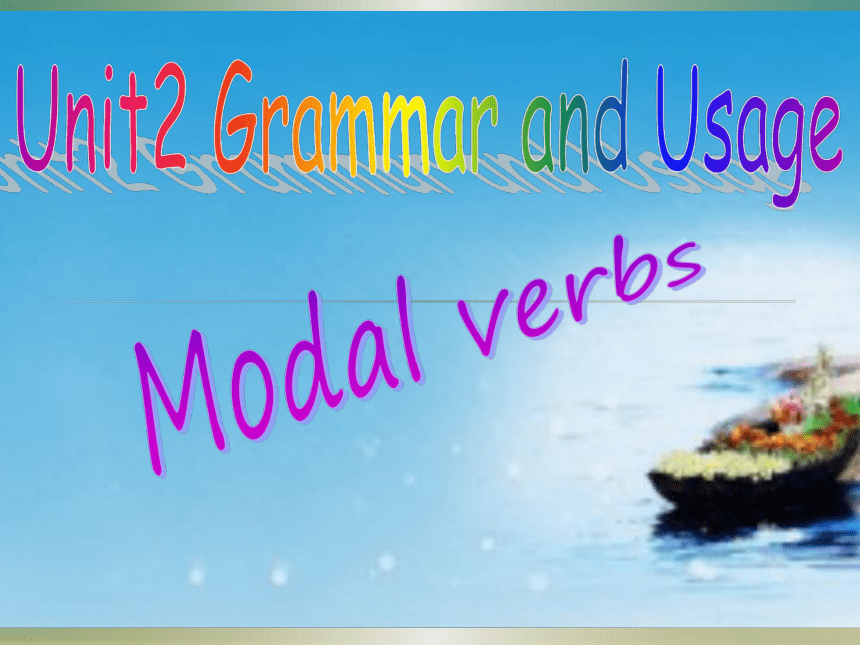
|
|
| 格式 | zip | ||
| 文件大小 | 745.3KB | ||
| 资源类型 | 教案 | ||
| 版本资源 | 牛津译林版 | ||
| 科目 | 英语 | ||
| 更新时间 | 2020-01-09 22:47:34 | ||
图片预览


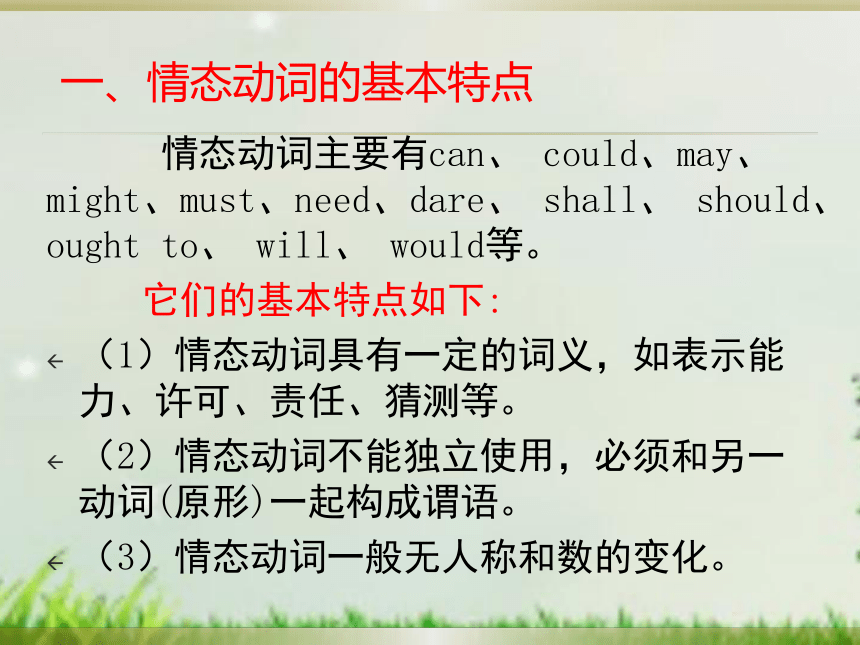
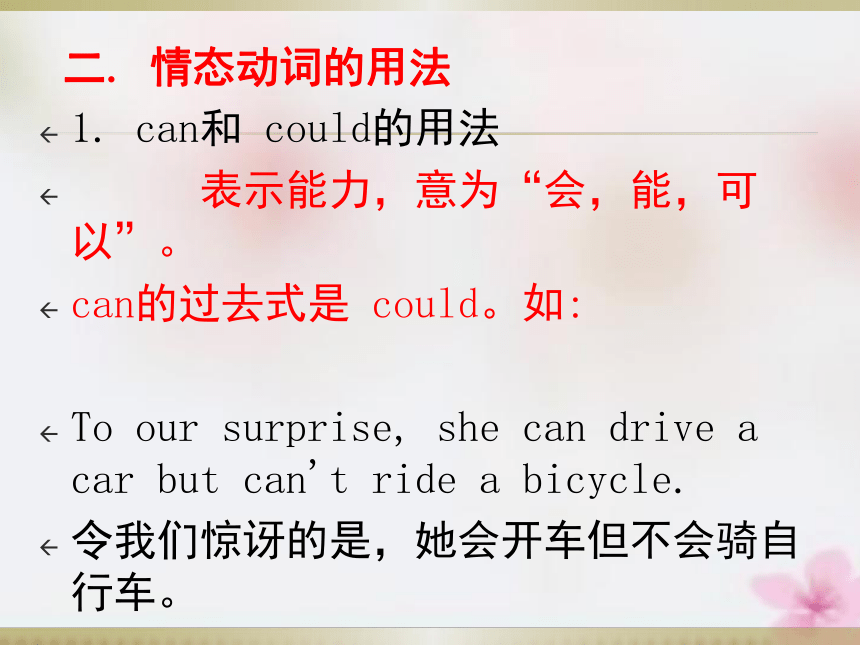
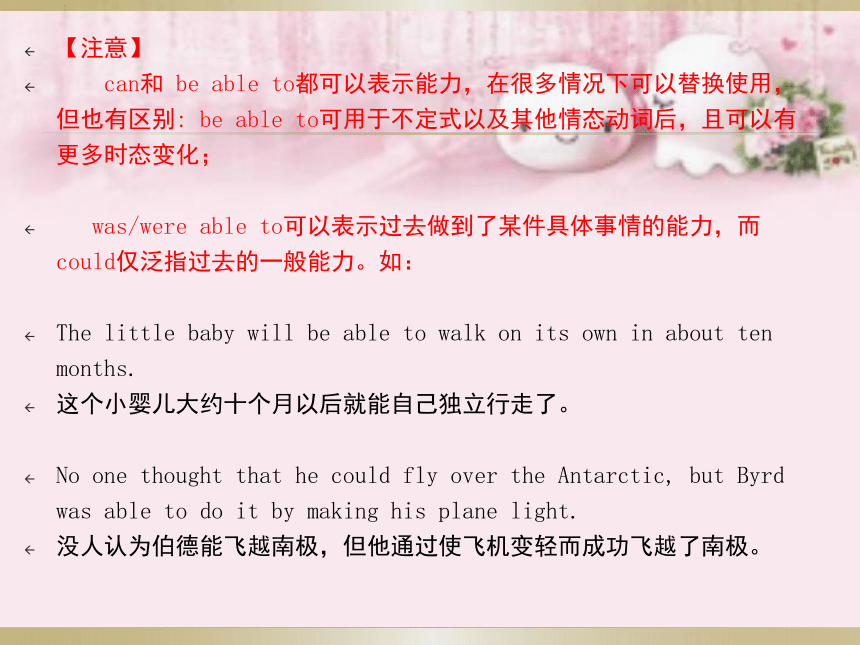
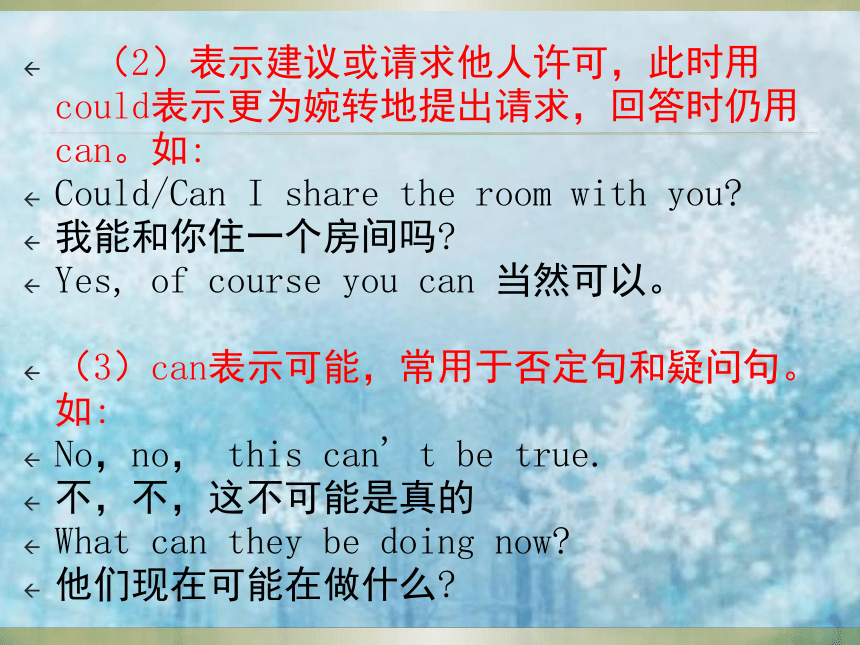
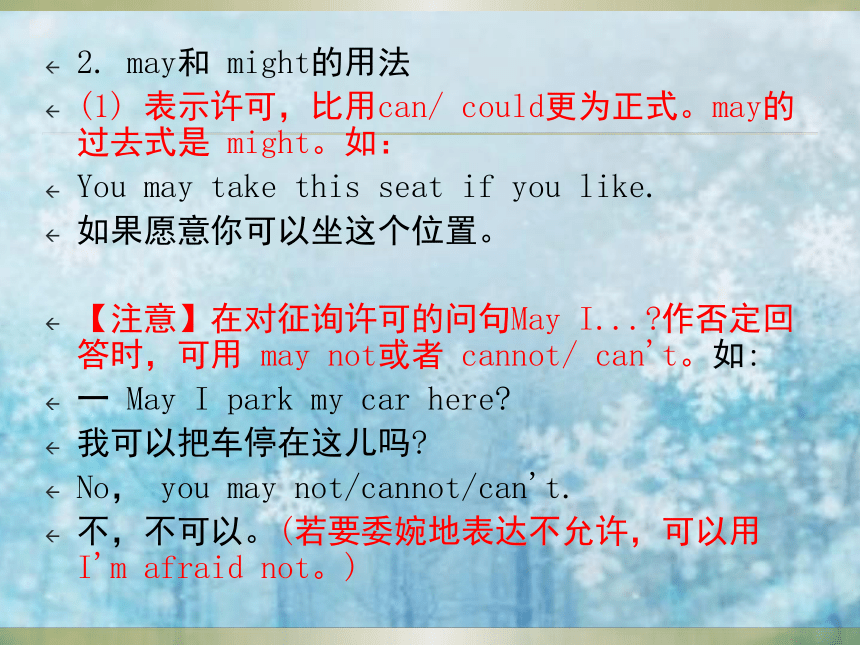
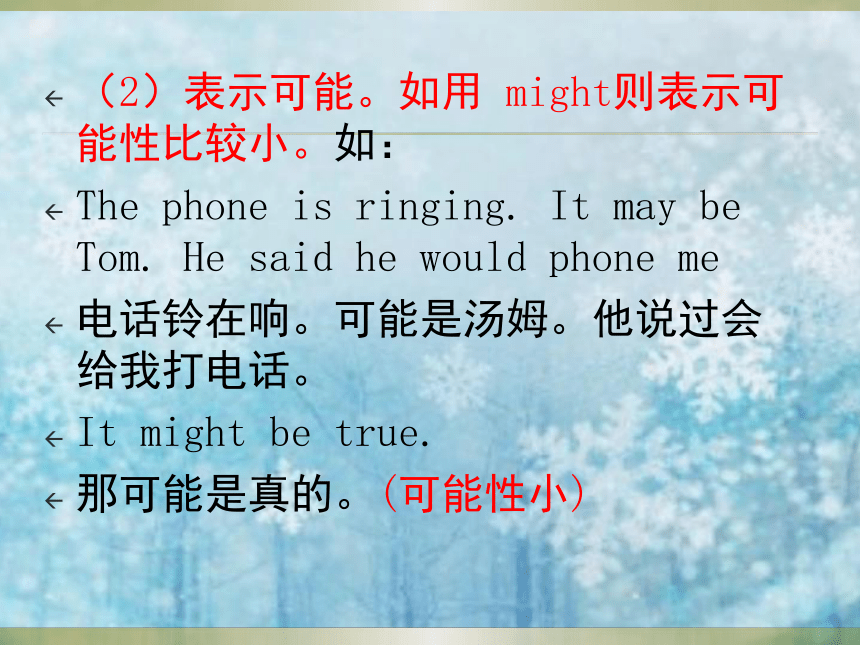
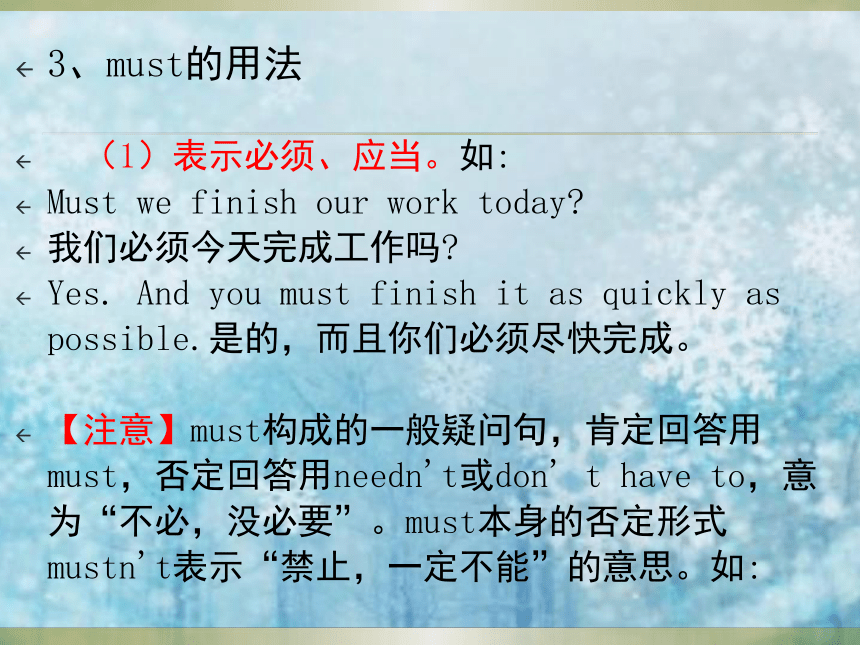
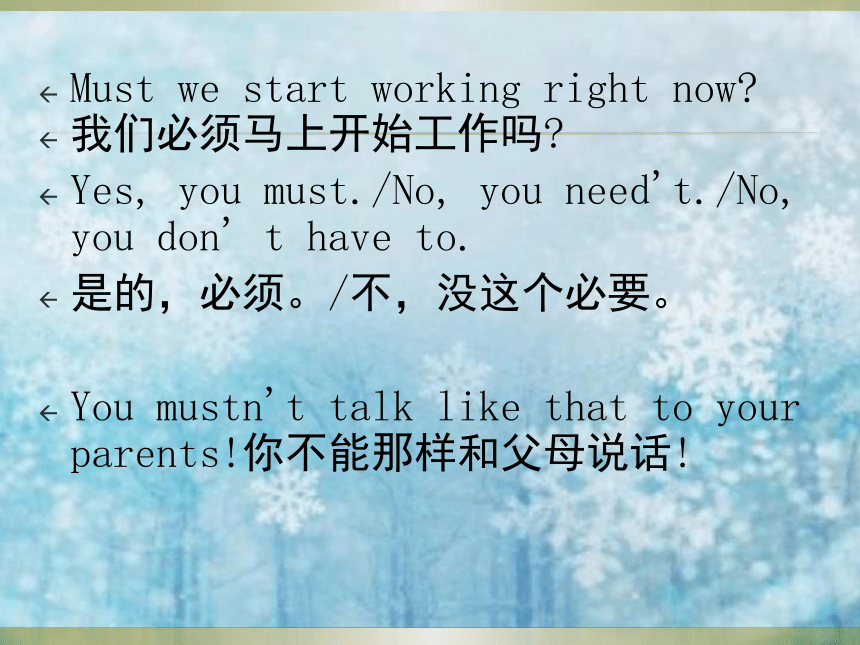
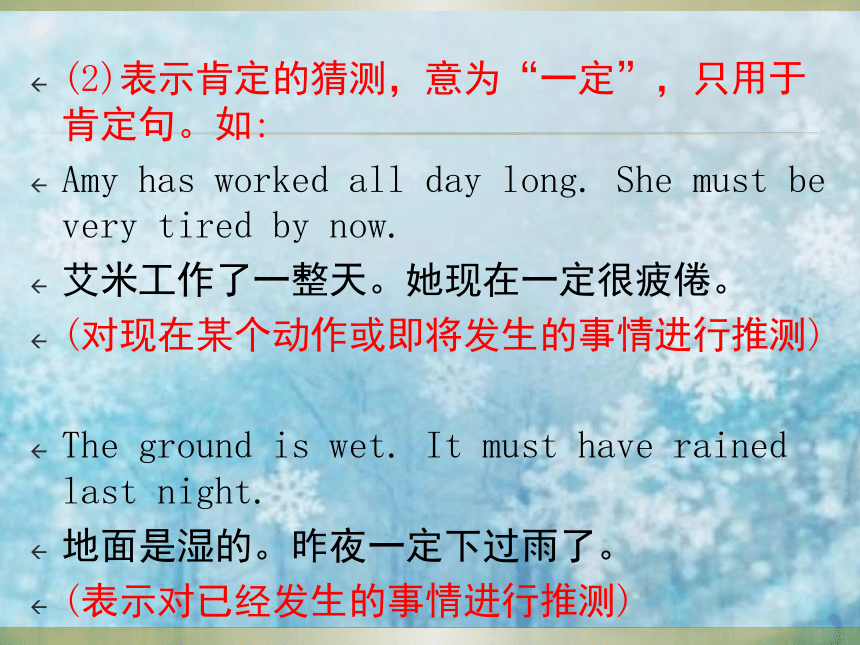

文档简介
课件49张PPT。Unit2 Grammar and UsageModal verbs What’s the definition of modal verbs? 情态动词是一种本身有一定的词义,表示说话人的情绪,态度或语气的动词,但不能单独作谓语,只能和其他动词原形构成谓语。 一、情态动词的基本特点 情态动词主要有can、 could、may、 might、must、need、dare、 shall、 should、 ought to、 will、 would等。
它们的基本特点如下:
(1)情态动词具有一定的词义,如表示能力、许可、责任、猜测等。
(2)情态动词不能独立使用,必须和另一动词(原形)一起构成谓语。
(3)情态动词一般无人称和数的变化。1. can和 could的用法
表示能力,意为“会,能,可以”。
can的过去式是 could。如:
To our surprise, she can drive a car but can't ride a bicycle.
令我们惊讶的是,她会开车但不会骑自行车。
二. 情态动词的用法 【注意】
can和 be able to都可以表示能力,在很多情况下可以替换使用,但也有区别: be able to可用于不定式以及其他情态动词后,且可以有更多时态变化;
was/were able to可以表示过去做到了某件具体事情的能力,而 could仅泛指过去的一般能力。如:
The little baby will be able to walk on its own in about ten months.
这个小婴儿大约十个月以后就能自己独立行走了。
No one thought that he could fly over the Antarctic, but Byrd was able to do it by making his plane light.
没人认为伯德能飞越南极,但他通过使飞机变轻而成功飞越了南极。 (2)表示建议或请求他人许可,此时用 could表示更为婉转地提出请求,回答时仍用can。如:
Could/Can I share the room with you?
我能和你住一个房间吗?
Yes, of course you can 当然可以。
(3)can表示可能,常用于否定句和疑问句。如:
No,no, this can' t be true.
不,不,这不可能是真的
What can they be doing now?
他们现在可能在做什么?2. may和 might的用法
(1) 表示许可,比用can/ could更为正式。may的过去式是 might。如:
You may take this seat if you like.
如果愿意你可以坐这个位置。
【注意】在对征询许可的问句May I...?作否定回答时,可用 may not或者 cannot/ can't。如:
一 May I park my car here?
我可以把车停在这儿吗?
No, you may not/cannot/can't.
不,不可以。(若要委婉地表达不允许,可以用I'm afraid not。)(2)表示可能。如用 might则表示可能性比较小。如:
The phone is ringing. It may be Tom. He said he would phone me
电话铃在响。可能是汤姆。他说过会给我打电话。
It might be true.
那可能是真的。(可能性小)3、must的用法
(1)表示必须、应当。如:
Must we finish our work today?
我们必须今天完成工作吗?
Yes. And you must finish it as quickly as possible.是的,而且你们必须尽快完成。
【注意】must构成的一般疑问句,肯定回答用must,否定回答用needn't或don' t have to,意为“不必,没必要”。must本身的否定形式 mustn't表示“禁止,一定不能”的意思。如:
Must we start working right now?
我们必须马上开始工作吗?
Yes, you must./No, you need't./No, you don' t have to.
是的,必须。/不,没这个必要。
You mustn't talk like that to your parents!你不能那样和父母说话!(2)表示肯定的猜测,意为“一定”,只用于肯定句。如:
Amy has worked all day long. She must be very tired by now.
艾米工作了一整天。她现在一定很疲倦。
(对现在某个动作或即将发生的事情进行推测)
The ground is wet. It must have rained last night.
地面是湿的。昨夜一定下过雨了。
(表示对已经发生的事情进行推测)(3) 表示“偏要”,常用于疑问句。如:
Must you play the piano at such a late time? It's midnight
你偏要在这么晚弹钢琴吗?已经是午夜了。
4. can、may和must推测性用法的区别
can在表示猜测可能性的时候,常用于否定句和疑问句;
may在表示推测的时候,一般不用于疑问句;must表示肯定的猜测,只用于肯定句。如:---Who can it be? Can it be Mr Smith?
那会是谁?会是史密斯先生吗?
---It can‘t be him. He has gone to Nanjing. It may be Mr Johnson
不可能是他。他去南京了。大概是约翰逊先生吧?
---Yeah, you're right. It must be him. His red coat always makes him stand out.
对,你说得对。肯定是他。他的红外套总让他很显眼。5. shall和 should的用法
(1)表示征求对方的意见或向对方请示,用于第一、第三人称疑问句中。如:
Shall/Should we begin our meeting?
我们开始开会好吗?
(2)shall用于第二、第三人称主语后,表示说话人给对方命令、警告、允诺或威胁等。如:
He shall choose the winner.他得挑选获胜者
(3) shall用于第三人称主语后,在条约、规定、法令、合同等文件中表示义务或规定。
The school rules state that no student shall be allowed out of the school during the day.
学校规定在白天学生不应该被准许离校。(4) should可表示劝告、建议等,相当于 ought to(否定形式为 ought not to)。如:
You should/ought to work hard if you want to catch up with others
要想赶上他人,你就应该努力学习。
(5) should可表示说话人的特殊情感,如惊奇、愤怒、失望等。如:
Don' t ask me. How should I know?
不要问我。我怎么会知道?6. will和 would的用法
(1) 表示说话人的意志、愿望或决心。如:
I will/ would never do that again.
我再也不会那样做了。
(2) 表示请求、建议等。
would语气更加委婉。如:
Would/Will you please pass me the book?
请把书递给我好吗? (3) 表示料想或猜想。如:
I think Li Lei will/would help you with your English.
我想李雷会帮你学英语的。
(4) 表示习惯。表示现在的习惯用will,表示过去的习惯用 would。如:
In fine weather he will often sit in the sun for hours.
天气好的时候他常在阳光下一坐就是几个小时。6.可兼做行为动词的情态动词:need 、 dare 情态动词 (+动词原形)行为动词 .needdare 1.无人称和数的变化; 2.尤其用于:*否定句及疑问句中;*在if/whether之后;*或与hardly, never,
no one, nobody连用; 3.常以needn’t 和daren’t
的形式出现;4.dare有其过去时dared. 多用于肯定句;
need to do
dare to do
need to be done
need doing
1.判断正误:
How dare you say such a thing?
How dare you to say such a thing?He daren’t to speak English before such a
crowd, did he?
He daren’t speak English before such a
crowd, dare he?ExercisesNobody need to be afraid of catching the disease.
Nobody need be afraid of catching the disease.These dishes need be cleaned carefully.
These dishes need to be cleaned carefully.
These dishes need cleaning carefully. 表示否定的情态动词的用法:
部分情态动词的否定式是情态动词中的考点
之一。
mustn’t 不准, 禁止
needn’t 没必要 ( = don’t have to )
can’t 不能; 不可能
may not 不可以; 可能不
shouldn’t 不应该 ( = ought not to )Attention: 4.would与used to 的区别would表过去反复发生得动作或某种倾向 ??????????“总是,总要”
used?to表过去常常(现在已没有这种习惯) ??????????“过去常常”
used?to?可于状态动词连用 would不可以 Attention:情态动词表示推测的用法
(语气从强到弱)
1._____所表示的可能性最大,最有把握,意为“一定”。
2.can和could主要用于____句和___句中,can’t或couldn’t 表示“不可能”。
3.may和might表示现在或将来可能发生的动作或情况,主要用于____句中,might相对于may来说,表示的可能性更小一些。must→should→can→could→may→mightmust否定疑问肯定最新高考真题链接
高考真题再现
1. — I take the book out?
—I'm afraid not.
A. Will B. May C. Must D. Need考点:考查情态动词。
解析:表请求可用情态动词can, may, could, might ,表允许用can, may.
句意为:“我可以将这本书带出去吗?”“恐怕不行”。故应选表请求的情态动词may。正确答案为B。答案:B
2. May I take this book out of the reading room?
No, you . You read it in here.
A. mightn’t B. won’t
C. needn’t D. mustn’t解析:考查情态动词。英语中用could,might表示询问或征求意见的问句中,肯定性应答要用can或may来代替could或might,而may或might征求意见的问句否定应答时要用mustn’t,表示禁止.故本题选D。答案:D(
3. You buy a gift, but you can if you want to.
A. must B. mustn't
C. have to D. don't have to 考点:情态动词
解析:don’t have to 意为“没有必要”,符合语境,句意为:“你没有必要买礼物,但如果你想买的话,你也可以买。”答案:D
4. “You ____ have a wrong number,” she said. “There’s no one of that name here.”
A. need B. can
C. must D. would 考点:情态动词
解析:肯定猜测,用must答案:C
5.I’m afraid Mr. Harding _________see you now. He’s busy.
A. can’t B. mustn’t
C. shouldn’t D .needn’t解析:情态动词考查。结合语境,根据情态动词用于疑问或否定推测时,要用can’t。答案:A翻译句子(利用情态动词)1.昨晚那间屋子着火了,但那家人都逃了出来;
2.我不会告诉老师这件事;
3.办公室不能抽烟 ;
4.灯还亮着,他肯定在书房读小说;1.The house caught fire last night, but the family was all able to escape.翻译句子(利用情态动词)4.The light is still on. He must be reading in the study.3.You mustn’t smoke in the office.2.I won't tell the teacher about it .Let's have a try!Practice:
1.?— __?I?water?the?trees?on?Tuesday??? ?— No,?you?needn’t.? A.?Can? B.?Must? C.?May? D.?Shall?? 2.?He?_____?not?pay?unless?he?is?punished?
to?pay.?? A.?shall B.?will? C.?can? D.?would?? 3.?I?_____?such?a?mistake?again.?? A.?shall?never?make?B.?may?never?make? C.?can?never?do? D.?need? BAB4.?—_____?I?turn?on?the?radio??
You’d?better?not.?It?is?noisy?enough?in?this?room.? A.?Shall? B.?Must? C.?Need? D.?Do?
5.?Since?the?road?is?wet?this?morning,?_____?last?night.?? A.?it?must?rain? ? B.?it?must?have?rained?? C.?it?must?be?rained? D.?it?must?have?been?rained?? AB4.?—_____?I?turn?on?the?radio??
You’d?better?not.?It?is?noisy?enough?in?this?room.? A.?Shall? B.?Must? C.?Need? D.?Do?
5.?Since?the?road?is?wet?this?morning,?_____?last?night.?? A.?it?must?rain? ? B.?it?must?have?rained?? C.?it?must?be?rained? D.?it?must?have?been?rained?? AB6.?Everyone?_____?do?his?best?to?make?the?world?safe?and?clean.?? A.?can? B.?may?C.?should? D.?had?to??
7.?They?_____?that?far;?but?they?stopped?to?have?a?snack?on?the?way.?? A.?might?be?gone? B.?needed?go?
C.?could?have?gone? D.?ought?have?gone
8.?You?_____?get?down?the?bus?until?the?
bus?has?stopped.?? A.?can’t? B.?needn’t?C.?mustn’t?D.?don’tCCD情态动词+have+过去分词
must have done
can/could +have done
should /ought to +have done
may/might +have done
needn't +have done路上是湿的。昨晚一定下雨了。
The road is wet. It_____ ___ _____
last night.
---My cat's really fat.
---You __ have given her so much food.
A.wouldn't B.couldn't
C.shouldn't D.mustn't
答案:Cmust have rainedmust have done 表示对过去肯定的推测。
1.仅用在肯定句中,表示对过去发生的行为的推测,“一定… 准是…”
2.反义疑问句:didn't 或者 haven't.
He must have studied English last night,didn't he ?
因为有last night,表示的是过去的时间状语,所以用didn't。
He must have studied English for years,hasn't he ?
因为有for years 表示一段时间,持续至今,所以用现在完成时。can/could +have done表示对过去否定疑问的推测。
1.只能用在否定和疑问句中。
2.时间上都表示过去,语气上can比could更肯定
3.could+have done 常表示对过去可能做而没有做某事的遗憾,不高兴。
She ___ have left school,for her bike is still here.
A.can't B wouldn't
C shouldn't D needn't
答案:A
He paid for a seat ,when he ___have entered free.
A.could B.would C.must D.need
答案:Ashould /ought to +have done
1.肯定句中,表示过去应该做而实际上没有做的事。
2.否定句中,表示不该做而实际上做了。
3.ought to 比should 口气更强烈
Tom ought not to ___ me your secret, but he meant no harm.
A.have told B.tell
C.be telling D having told
答案:Amay/might +have done 对过去某事可能性的推测。
1.might 比may的可能性更小
2.might have done 表示“本该…… 而 没…”.表示委婉的责备、遗憾、愤怒。
3.如果主句动词是过去时,间接引语只能用
might have done
4.may +have done 只能用于肯定或否定句中。--Where is my book ?I remember I put it here yesterday.
---You __ it in the wrong place.
A must put B.should have put
C.might put Dmight have put
答案:D
He __you more help,even though he was very busy.
A.might have given B.might give
C.may have given D.may give
答案:Aneedn't +have done 表示做了没有必要的事。只用在否定和疑问句中。
-Joe,I have cleaned the room for you
--Thanks.You ___it .I could manage it myself.
A.needn't do B.needn't have done
C.mustn't do D. shouldn't have done
答案:B
比较:She needn't have come to see me yesterday.
She didn't need to come to see me yesterday
Pay attention to
情态动词+have done结构即可以表示虚拟又可以表示推测
Could have done a .可能已经…… (表示猜测)
b.本来能够做 却没做 (表示虚拟)
Might have done a.可能,也许,已经 ……. (表示猜测)
b. 本可以做却没做 (表示虚拟)
HomeworkReview the usage of modal verbs and finish the exercise paper
它们的基本特点如下:
(1)情态动词具有一定的词义,如表示能力、许可、责任、猜测等。
(2)情态动词不能独立使用,必须和另一动词(原形)一起构成谓语。
(3)情态动词一般无人称和数的变化。1. can和 could的用法
表示能力,意为“会,能,可以”。
can的过去式是 could。如:
To our surprise, she can drive a car but can't ride a bicycle.
令我们惊讶的是,她会开车但不会骑自行车。
二. 情态动词的用法 【注意】
can和 be able to都可以表示能力,在很多情况下可以替换使用,但也有区别: be able to可用于不定式以及其他情态动词后,且可以有更多时态变化;
was/were able to可以表示过去做到了某件具体事情的能力,而 could仅泛指过去的一般能力。如:
The little baby will be able to walk on its own in about ten months.
这个小婴儿大约十个月以后就能自己独立行走了。
No one thought that he could fly over the Antarctic, but Byrd was able to do it by making his plane light.
没人认为伯德能飞越南极,但他通过使飞机变轻而成功飞越了南极。 (2)表示建议或请求他人许可,此时用 could表示更为婉转地提出请求,回答时仍用can。如:
Could/Can I share the room with you?
我能和你住一个房间吗?
Yes, of course you can 当然可以。
(3)can表示可能,常用于否定句和疑问句。如:
No,no, this can' t be true.
不,不,这不可能是真的
What can they be doing now?
他们现在可能在做什么?2. may和 might的用法
(1) 表示许可,比用can/ could更为正式。may的过去式是 might。如:
You may take this seat if you like.
如果愿意你可以坐这个位置。
【注意】在对征询许可的问句May I...?作否定回答时,可用 may not或者 cannot/ can't。如:
一 May I park my car here?
我可以把车停在这儿吗?
No, you may not/cannot/can't.
不,不可以。(若要委婉地表达不允许,可以用I'm afraid not。)(2)表示可能。如用 might则表示可能性比较小。如:
The phone is ringing. It may be Tom. He said he would phone me
电话铃在响。可能是汤姆。他说过会给我打电话。
It might be true.
那可能是真的。(可能性小)3、must的用法
(1)表示必须、应当。如:
Must we finish our work today?
我们必须今天完成工作吗?
Yes. And you must finish it as quickly as possible.是的,而且你们必须尽快完成。
【注意】must构成的一般疑问句,肯定回答用must,否定回答用needn't或don' t have to,意为“不必,没必要”。must本身的否定形式 mustn't表示“禁止,一定不能”的意思。如:
Must we start working right now?
我们必须马上开始工作吗?
Yes, you must./No, you need't./No, you don' t have to.
是的,必须。/不,没这个必要。
You mustn't talk like that to your parents!你不能那样和父母说话!(2)表示肯定的猜测,意为“一定”,只用于肯定句。如:
Amy has worked all day long. She must be very tired by now.
艾米工作了一整天。她现在一定很疲倦。
(对现在某个动作或即将发生的事情进行推测)
The ground is wet. It must have rained last night.
地面是湿的。昨夜一定下过雨了。
(表示对已经发生的事情进行推测)(3) 表示“偏要”,常用于疑问句。如:
Must you play the piano at such a late time? It's midnight
你偏要在这么晚弹钢琴吗?已经是午夜了。
4. can、may和must推测性用法的区别
can在表示猜测可能性的时候,常用于否定句和疑问句;
may在表示推测的时候,一般不用于疑问句;must表示肯定的猜测,只用于肯定句。如:---Who can it be? Can it be Mr Smith?
那会是谁?会是史密斯先生吗?
---It can‘t be him. He has gone to Nanjing. It may be Mr Johnson
不可能是他。他去南京了。大概是约翰逊先生吧?
---Yeah, you're right. It must be him. His red coat always makes him stand out.
对,你说得对。肯定是他。他的红外套总让他很显眼。5. shall和 should的用法
(1)表示征求对方的意见或向对方请示,用于第一、第三人称疑问句中。如:
Shall/Should we begin our meeting?
我们开始开会好吗?
(2)shall用于第二、第三人称主语后,表示说话人给对方命令、警告、允诺或威胁等。如:
He shall choose the winner.他得挑选获胜者
(3) shall用于第三人称主语后,在条约、规定、法令、合同等文件中表示义务或规定。
The school rules state that no student shall be allowed out of the school during the day.
学校规定在白天学生不应该被准许离校。(4) should可表示劝告、建议等,相当于 ought to(否定形式为 ought not to)。如:
You should/ought to work hard if you want to catch up with others
要想赶上他人,你就应该努力学习。
(5) should可表示说话人的特殊情感,如惊奇、愤怒、失望等。如:
Don' t ask me. How should I know?
不要问我。我怎么会知道?6. will和 would的用法
(1) 表示说话人的意志、愿望或决心。如:
I will/ would never do that again.
我再也不会那样做了。
(2) 表示请求、建议等。
would语气更加委婉。如:
Would/Will you please pass me the book?
请把书递给我好吗? (3) 表示料想或猜想。如:
I think Li Lei will/would help you with your English.
我想李雷会帮你学英语的。
(4) 表示习惯。表示现在的习惯用will,表示过去的习惯用 would。如:
In fine weather he will often sit in the sun for hours.
天气好的时候他常在阳光下一坐就是几个小时。6.可兼做行为动词的情态动词:need 、 dare 情态动词 (+动词原形)行为动词 .needdare 1.无人称和数的变化; 2.尤其用于:*否定句及疑问句中;*在if/whether之后;*或与hardly, never,
no one, nobody连用; 3.常以needn’t 和daren’t
的形式出现;4.dare有其过去时dared. 多用于肯定句;
need to do
dare to do
need to be done
need doing
1.判断正误:
How dare you say such a thing?
How dare you to say such a thing?He daren’t to speak English before such a
crowd, did he?
He daren’t speak English before such a
crowd, dare he?ExercisesNobody need to be afraid of catching the disease.
Nobody need be afraid of catching the disease.These dishes need be cleaned carefully.
These dishes need to be cleaned carefully.
These dishes need cleaning carefully. 表示否定的情态动词的用法:
部分情态动词的否定式是情态动词中的考点
之一。
mustn’t 不准, 禁止
needn’t 没必要 ( = don’t have to )
can’t 不能; 不可能
may not 不可以; 可能不
shouldn’t 不应该 ( = ought not to )Attention: 4.would与used to 的区别would表过去反复发生得动作或某种倾向 ??????????“总是,总要”
used?to表过去常常(现在已没有这种习惯) ??????????“过去常常”
used?to?可于状态动词连用 would不可以 Attention:情态动词表示推测的用法
(语气从强到弱)
1._____所表示的可能性最大,最有把握,意为“一定”。
2.can和could主要用于____句和___句中,can’t或couldn’t 表示“不可能”。
3.may和might表示现在或将来可能发生的动作或情况,主要用于____句中,might相对于may来说,表示的可能性更小一些。must→should→can→could→may→mightmust否定疑问肯定最新高考真题链接
高考真题再现
1. — I take the book out?
—I'm afraid not.
A. Will B. May C. Must D. Need考点:考查情态动词。
解析:表请求可用情态动词can, may, could, might ,表允许用can, may.
句意为:“我可以将这本书带出去吗?”“恐怕不行”。故应选表请求的情态动词may。正确答案为B。答案:B
2. May I take this book out of the reading room?
No, you . You read it in here.
A. mightn’t B. won’t
C. needn’t D. mustn’t解析:考查情态动词。英语中用could,might表示询问或征求意见的问句中,肯定性应答要用can或may来代替could或might,而may或might征求意见的问句否定应答时要用mustn’t,表示禁止.故本题选D。答案:D(
3. You buy a gift, but you can if you want to.
A. must B. mustn't
C. have to D. don't have to 考点:情态动词
解析:don’t have to 意为“没有必要”,符合语境,句意为:“你没有必要买礼物,但如果你想买的话,你也可以买。”答案:D
4. “You ____ have a wrong number,” she said. “There’s no one of that name here.”
A. need B. can
C. must D. would 考点:情态动词
解析:肯定猜测,用must答案:C
5.I’m afraid Mr. Harding _________see you now. He’s busy.
A. can’t B. mustn’t
C. shouldn’t D .needn’t解析:情态动词考查。结合语境,根据情态动词用于疑问或否定推测时,要用can’t。答案:A翻译句子(利用情态动词)1.昨晚那间屋子着火了,但那家人都逃了出来;
2.我不会告诉老师这件事;
3.办公室不能抽烟 ;
4.灯还亮着,他肯定在书房读小说;1.The house caught fire last night, but the family was all able to escape.翻译句子(利用情态动词)4.The light is still on. He must be reading in the study.3.You mustn’t smoke in the office.2.I won't tell the teacher about it .Let's have a try!Practice:
1.?— __?I?water?the?trees?on?Tuesday??? ?— No,?you?needn’t.? A.?Can? B.?Must? C.?May? D.?Shall?? 2.?He?_____?not?pay?unless?he?is?punished?
to?pay.?? A.?shall B.?will? C.?can? D.?would?? 3.?I?_____?such?a?mistake?again.?? A.?shall?never?make?B.?may?never?make? C.?can?never?do? D.?need? BAB4.?—_____?I?turn?on?the?radio??
You’d?better?not.?It?is?noisy?enough?in?this?room.? A.?Shall? B.?Must? C.?Need? D.?Do?
5.?Since?the?road?is?wet?this?morning,?_____?last?night.?? A.?it?must?rain? ? B.?it?must?have?rained?? C.?it?must?be?rained? D.?it?must?have?been?rained?? AB4.?—_____?I?turn?on?the?radio??
You’d?better?not.?It?is?noisy?enough?in?this?room.? A.?Shall? B.?Must? C.?Need? D.?Do?
5.?Since?the?road?is?wet?this?morning,?_____?last?night.?? A.?it?must?rain? ? B.?it?must?have?rained?? C.?it?must?be?rained? D.?it?must?have?been?rained?? AB6.?Everyone?_____?do?his?best?to?make?the?world?safe?and?clean.?? A.?can? B.?may?C.?should? D.?had?to??
7.?They?_____?that?far;?but?they?stopped?to?have?a?snack?on?the?way.?? A.?might?be?gone? B.?needed?go?
C.?could?have?gone? D.?ought?have?gone
8.?You?_____?get?down?the?bus?until?the?
bus?has?stopped.?? A.?can’t? B.?needn’t?C.?mustn’t?D.?don’tCCD情态动词+have+过去分词
must have done
can/could +have done
should /ought to +have done
may/might +have done
needn't +have done路上是湿的。昨晚一定下雨了。
The road is wet. It_____ ___ _____
last night.
---My cat's really fat.
---You __ have given her so much food.
A.wouldn't B.couldn't
C.shouldn't D.mustn't
答案:Cmust have rainedmust have done 表示对过去肯定的推测。
1.仅用在肯定句中,表示对过去发生的行为的推测,“一定… 准是…”
2.反义疑问句:didn't 或者 haven't.
He must have studied English last night,didn't he ?
因为有last night,表示的是过去的时间状语,所以用didn't。
He must have studied English for years,hasn't he ?
因为有for years 表示一段时间,持续至今,所以用现在完成时。can/could +have done表示对过去否定疑问的推测。
1.只能用在否定和疑问句中。
2.时间上都表示过去,语气上can比could更肯定
3.could+have done 常表示对过去可能做而没有做某事的遗憾,不高兴。
She ___ have left school,for her bike is still here.
A.can't B wouldn't
C shouldn't D needn't
答案:A
He paid for a seat ,when he ___have entered free.
A.could B.would C.must D.need
答案:Ashould /ought to +have done
1.肯定句中,表示过去应该做而实际上没有做的事。
2.否定句中,表示不该做而实际上做了。
3.ought to 比should 口气更强烈
Tom ought not to ___ me your secret, but he meant no harm.
A.have told B.tell
C.be telling D having told
答案:Amay/might +have done 对过去某事可能性的推测。
1.might 比may的可能性更小
2.might have done 表示“本该…… 而 没…”.表示委婉的责备、遗憾、愤怒。
3.如果主句动词是过去时,间接引语只能用
might have done
4.may +have done 只能用于肯定或否定句中。--Where is my book ?I remember I put it here yesterday.
---You __ it in the wrong place.
A must put B.should have put
C.might put Dmight have put
答案:D
He __you more help,even though he was very busy.
A.might have given B.might give
C.may have given D.may give
答案:Aneedn't +have done 表示做了没有必要的事。只用在否定和疑问句中。
-Joe,I have cleaned the room for you
--Thanks.You ___it .I could manage it myself.
A.needn't do B.needn't have done
C.mustn't do D. shouldn't have done
答案:B
比较:She needn't have come to see me yesterday.
She didn't need to come to see me yesterday
Pay attention to
情态动词+have done结构即可以表示虚拟又可以表示推测
Could have done a .可能已经…… (表示猜测)
b.本来能够做 却没做 (表示虚拟)
Might have done a.可能,也许,已经 ……. (表示猜测)
b. 本可以做却没做 (表示虚拟)
HomeworkReview the usage of modal verbs and finish the exercise paper
